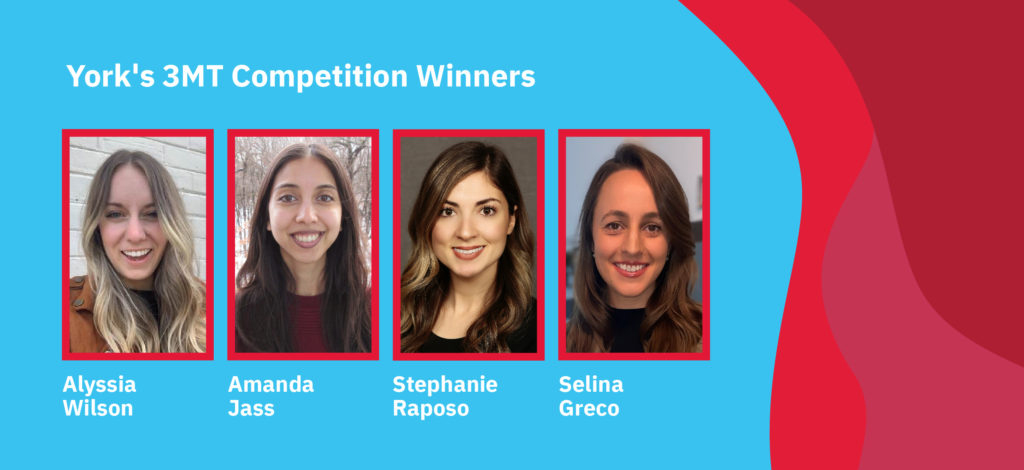Fourteen York graduate students shared their research during 3 Minute Thesis (3MT), a fun yet challenging academic competition coordinated every year by the Faculty of Graduate Studies at York University to celebrate and highlight graduate student research.
3MT is an international research symposium where graduate students across various disciplines have three minutes to present their research and its impact to a panel of non-specialist judges and peers. In Ontario, each university runs an internal competition to select a winner who competes at the provincial competition. In light of COVID-19, this year’s event was rescheduled to Fall 2020 and took place in a virtual setting.
The student winners were selected by judges Lyndon Martin, vice-provost Academic and professor in the Faculty of Education at York University; Bob McDonald, the host of CBC Radio’s Quirks & Quarks and Canadian author; Michael Johnny, knowledge mobilization manager at York University; and Lina Decker, doctoral student in psychology at York University, winner of last year’s York 3MT, and York’s University representative at the provincial 3MT composition.
“It is always a privilege to hear graduate students talk with such passion and care about their work, and a lovely opportunity to learn more about the kinds of research taking place within York – both why it matters, and how it will make a difference in the world,” said Martin, addressing York’s student participants. “Having to convey what are often deeply complex research questions in three minutes is quite the task. You were all wonderful ambassadors for your fields and for the University.”

York's 3MT competition winners: Alyssia Wilson, Amanda Jass, Stephanie Raposo and Selina Greco
The aspiration and freshness of York research can be recognized from first-place winner Alyssia Wilson (master’s student in psychology), whose presentation was titled “Altered brain activity related to contact exposure in sports.” Wilson’s research shows that based on how much contact female university athletes are exposed to, there are significant changes in those patterns of activities between different brain regions, even at rest.
Second-place winner Stephanie Raposo (doctoral student in psychology) delivered a presentation titled “Buffering Attachment Anxiety: The Benefits of Perceived Partner Sexual Responsiveness,” examining how the sexual domain is one key way for partners to express responsiveness, especially to those who are anxiously attached.
With such remarkable research topics, judges deliberated and settled with a draw in third place. Selina Greco (doctoral student in education) gave a presentation titled “Fostering Experiential Learning, Environmental Awareness and Mental Health through Farming Education Practices,” emphasizing how experiential learning on a farm finds meaning through promoting environmental awareness and ecological literacy, and ultimately strengthening mental health of adolescents. Amanda Jass (master’s student in biology) presented “Restoration of Learning and Memory in Autism,” outlining how the root cause of memory impairment and incensory abnormalities stem from overexcitation of the brain where imbalances between excitatory and inhibitory signals exist and create a scale shifted towards too much excitation.
“Overall, let me congratulate all the participants. I don't really like choosing winners because all the projects were so different from each other. The margins in scoring were very slim due to very high quality all around. So once again, thank you to everyone who took the time to prepare your presentations, I wish all of you the best success,” said McDonald.
Winners received prizes of $1,000, $500 and $250 respectively. This is the seventh year that York University has participated in the Canadian competition.
Provided by yFile.
